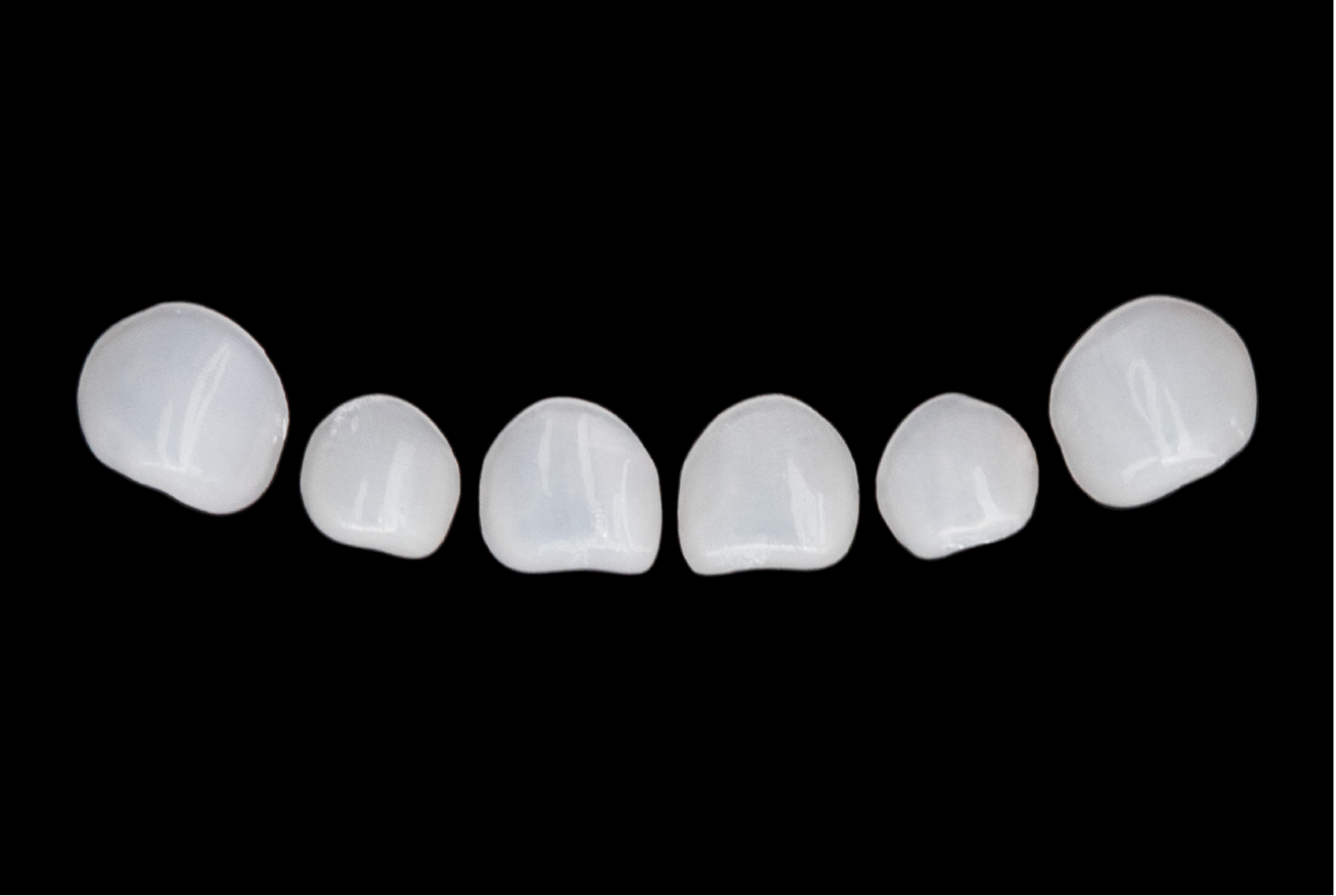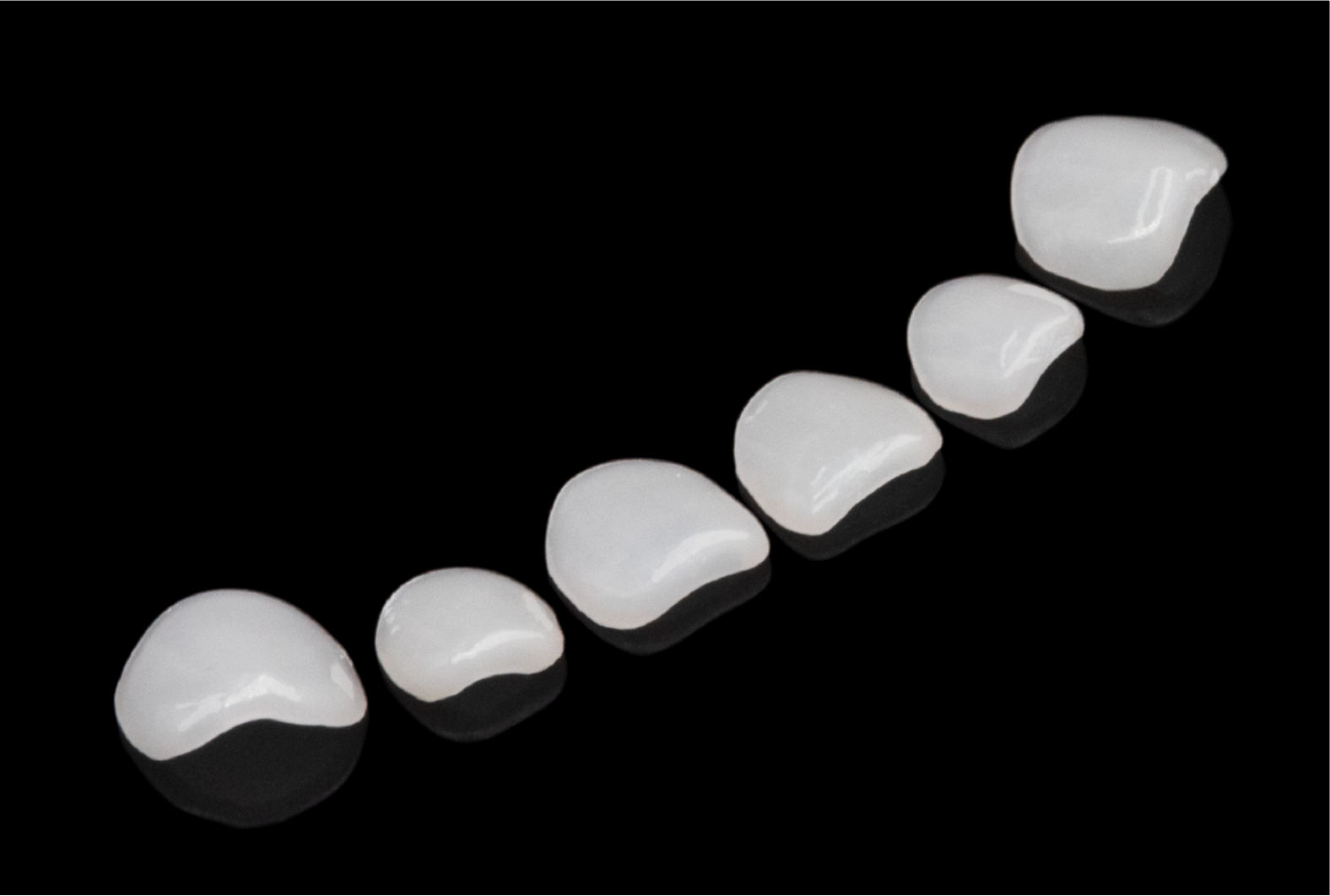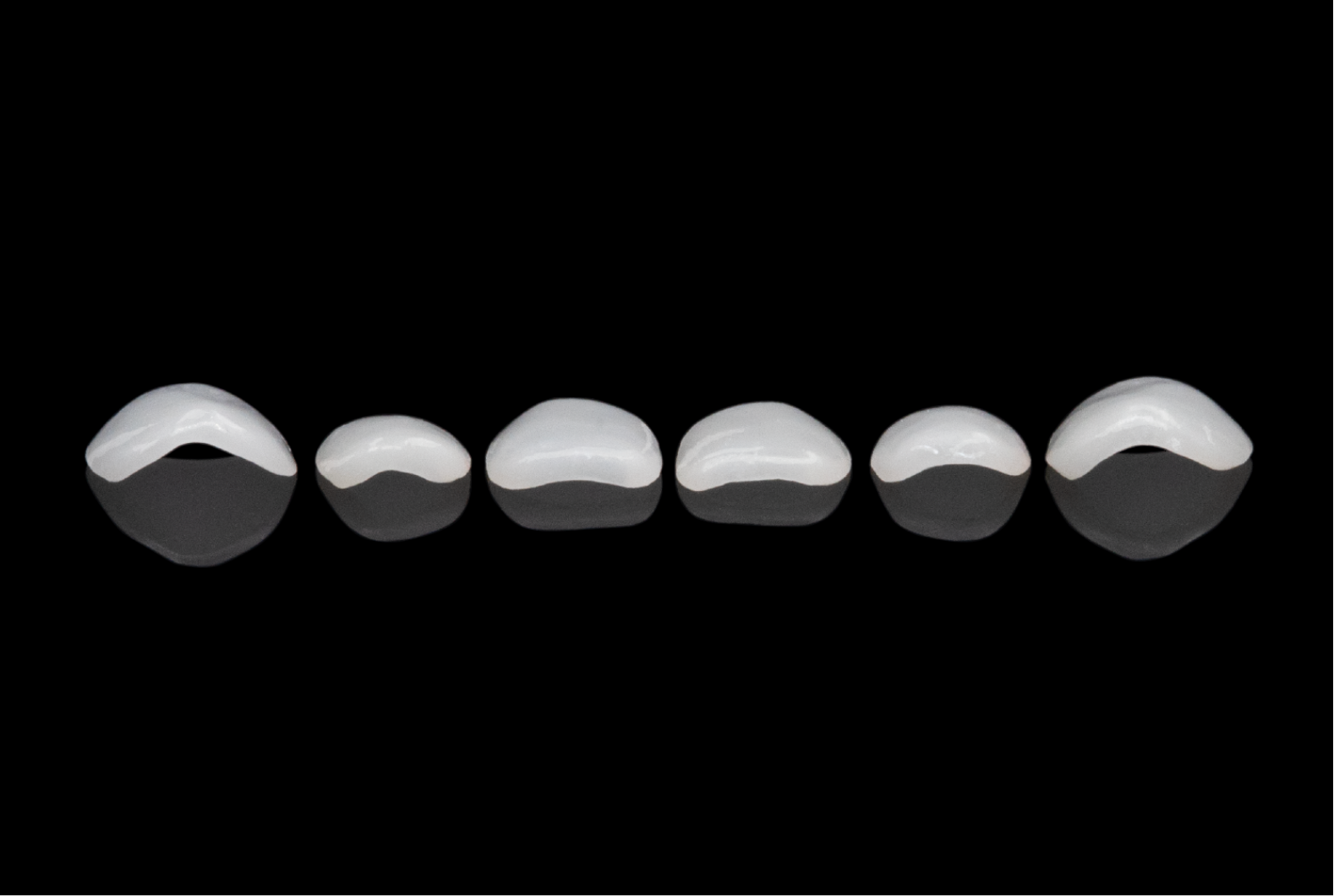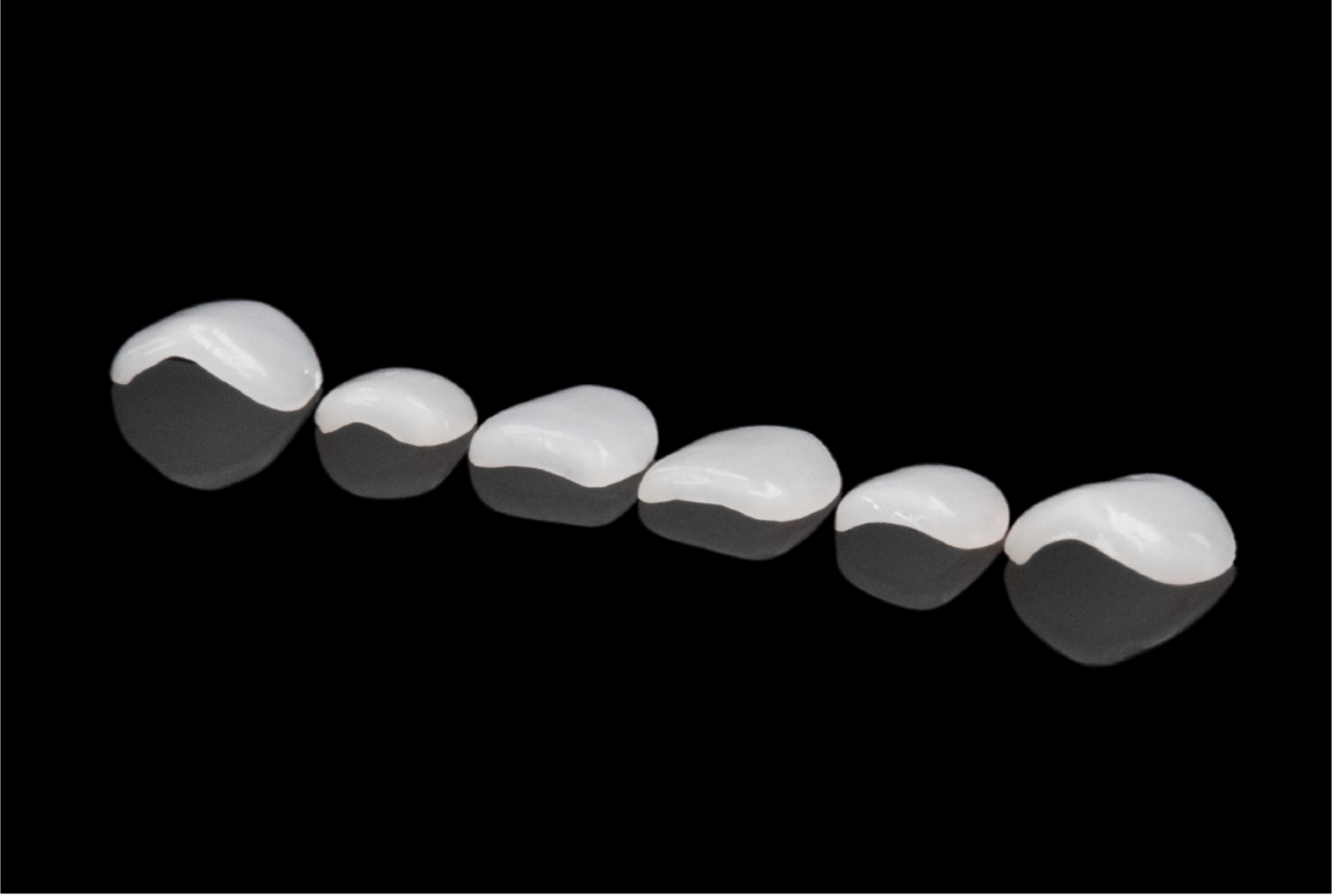“As a dentist, treating the child patient requires more of my attention, skill and care.
For me, the edelweiss PEDIATRIC VENEERs are the perfect way to create a perfect natural esthetic solution with minimal invasive procedures where I am in total control of the final outcome. My patients are never stressed and the parents are always happy with the results.
edelweiss PEDIATRIC VENEER
Sale price
Price
€35,99
Regular price
Unit price
/ per
Tax included.
edelweiss PEDIATRIC VENEER
The edelweiss PEDIATRIC VENEERs are produced using an innovative, patented laser process, where glass crystals are sintered and vitrified, resulting in a homogeneous glass-ceramic phase embedded in a carbon matrix. This bioceramic composition offers several advantages:
-
Biomimetic Mechanics: The material mimics the properties of natural teeth.
-
Esthetic Appearance: The veneers have a natural, aesthetic look.
-
Biocompatibility: They are free from BIS GMA, BIS EMA, and UDMA, making them highly body-compatible.
Anatomical Shape and High Aesthetics
The anatomical profiles of the edelweiss PEDIATRIC VENEERs ensure an accurate reproduction of natural primary teeth.
Prefabricated, Radiopaque Veneer
The prefabricated, radiopaque edelweiss PEDIATRIC VENEERS replicate the anatomical base of the enamel layer. When used with edelweiss COMPOSITE, they can be applied for both simple and complex restorations of primary teeth with superficial or deep caries.
-
Protection Until Natural Exfoliation: The PEDIATRIC VENEERs protect the primary tooth until its natural loss.
Simple and Quick Treatment
Treating the tooth with PEDIATRIC VENEERs is straightforward and quick, leading to a bioesthetic and functional end result that blends perfectly with the natural dentition. The required preparation is minimal and limited to the extent of the caries, reducing the risk of iatrogenic exposure of the pulp of the primary tooth.
Cementation
The PEDIATRIC VENEERs are cemented with the same material from which they are made, ensuring a stable connection for the entire restoration (dentin/enamel + composite + PEDIATRIC ). Alternatively, they can be cemented with conventional glass ionomer cement or resin-modified glass ionomer cement (RMGIC).
Downloads
- Instruction for use
- Fact Sheet
- Brochure
- Indication Guide
- Booklet_Step_by_Step
- Safety Data Sheet
- Tooth Size Overview
Composition
- Barium silicate glass
- Bis-GMA-based matrix of dental resin
- Pigments
- Additives
- Catalyst
Technical Data
Filler content: 82 wt.% The variation range of the inorganic filler particles is between 0.02-3µm.
Indikationen
- Anterior and posterior restorations
- Discoloration of primary teeth
- Morphological deformations
- Congenitally malformed primary teeth
- Developmental defects
- Poor enamel quality
- Increased carious activity
- Restoration of teeth after pulpectomy or pulpotomy procedures
- Fractured primary teeth following trauma
- Severe bruxism
- Erosion

Product Recommendation
PEDIATRIC VENEER

Experience the future in Pediatric Dental Care with edelweiss PEDIATRIC VENEERs





edelweiss PEDIATRIC VENEER
«Easy and safe treatment for a healthy smile in children»

Advantages
Unparalleled Innovation
edelweiss PEDIATRIC VENEERs are the world’s first veneers specifically designed for pediatric patients setting a new standard in pediatric dental care.
Enhanced Esthetics
These veneers are crafted using advanced technology and materials that closely mimic the appearance of natural teeth.
Minimally Invasive
edelweiss PEDIATRIC VENEERs are designed with a focus on preserving natural tooth structure which means less discomfort and reduced tooth preparation.
Durable and Long-Lasting
Our veneers are engineered to be durable and long-lasting, providing excellent resistance to wear and fracture.
Easy and Efficient Application
edelweiss PEDIATRIC VENEERs are designed to be user-friendly, enabling dentists to apply them with ease and efficiency making it more convenient for both the dental professional and the young patient.
Child-Friendly Materials
We understand the importance of using safe and bio-compatible materials for children. edelweiss PEDIATRIC VENEERs are crafted using high-quality materials that are specifically chosen to be safe and gentle on young teeth and gums. It is BPA free and plaque resistant.
Boost Confidence and Self-Esteem
edelweiss PEDIATRIC VENEERs can have a significant positive impact on their confidence and self-esteem by transforming a child’s smile. Help children feel more confident in social interactions and improve their overall wellbeing.
Professional Trust and Expertise
edelweiss PEDIATRIC VENEERs are developed in collaboration with leading dental professionals, ensuring a product that is backed by expertise and trusted by pediatric dentists worldwide.
edelweiss PEDIATRIC VENEER
are made of a laser sintered barium glass, which makes them both highly antibacterial and plaque resistant. These crowns are biocompatible; they have the same abrasion as natural teeth, hence the edelweiss PEDIATRIC VENEER does not damage the antagonist tooth. The mesial and distal margins of the edelweiss PEDIATRIC VENEER follow the natural gingival line of the milk teeth.
The edelweiss PEDIATRIC VENEER perfectly imitates the natural milk tooth in both form and function. The pre-fabricated, bio esthetical morphology allows for a quick and safe treatment. You can achieve maximum esthetical results, which are minimally invasive, in one appointment. No matter what the dental situation, edelweiss has the right veneer for it.
Composition

The composition of edelweiss PEDIATRIC VENEER
Barium silicate glass: single glass phase for optimum esthetics
and better bonding tooth structure
Aluminium oxide: strength and optical properties
Carbon: resilience and repairability
Zinc oxide: antibacterial (no biofilm formation)
Fluoride: hydroxyapatite regeneration and
antibacterial
SEM images show a smooth surface devoid of any cracks or voids
Smooth glass like structure resulting in long lasting shine with no staining.
The edelweiss PEDIATRIC VENEER shows a homogeneous layer of glass almost fused to form a single unit. There is a complete absence of voids or defects on the surface structure. (Mag = 3.00KX)

Higher magnification shows no surface defects with total absence of voids or cracks. This means a long-lasting shine and no chipping or crack propagation. (Mag = 7.44KX)

No Biofilm or bacterial growth on edelweiss PEDIATRIC VENEERs
The presence of zinc oxide nanoparticles and fluoride combats bacteria and biofilms on the surface and at tooth–restoration margins to inhibit marginal staining and secondary caries.

No bacteria and biofilm formation on edelweiss PEDIATRIC VENEER.

Bacterial growth observed on composite (control).
Child friendly
We care for our children’s health
We understand the importance of using safe and bio-compatible materials for children.
edelweiss PEDIATRIC VENEER are crafted using high-quality materials that are specifically chosen to be safe and gentle on young teeth and gums.
ALL edelweiss products are BPA free and bio-compatible.

Zero Bisphenol A
edelweiss PEDIATRIC VENEER is free of Bis-GMA & Bis-EMA

Biosustainable
The world’s first bio-sustainable pediatric veneer.

edelweiss PEDIATRIC VENEER are non-toxic
Toxicity Studies done on:
Human Stem Cells
Intracutaneous reactivity test (ISO 10993-23:2021)
Non-irritating to the skin or mucosa
Skin sensitization test (ISO 10993-10:2021)
We care for our planet
edelweiss PEDIATRIC VENEER is a safe product and in line with world trends of being the first pediatric veneer to be BPA free and bio-sustainable.

Mechanical Properties & Benefits
• Mimic natural form and function
• Bio-esthetical morphology
• Quick, easy and safe treatment
• Optimal esthetic results
• Mesial and distal margins follow the natural gingival-line
• Antibacterial, high plaque-resistance
• Biocompatible natural abrasion behavior
• No damage to primary antagonists
• Time saving, minimal or no preparation required
• Non/minimal-invasive, protects tooth structure
• Repairable in the mouth
• Can be individualized
Sizing Guides PEDIATRIC VENEER

SMALL / MEDIUM

LARGE / XLARGE

Shade Range

edelweiss Shade Guide
edelweiss dentin and enamel shades based on the natural layering technique.

Shade Selection
Placing the enamel VENEER shell over the dentin core.
For light refraction place glycerine within enamel shell first.
Natural Layering Technique
The concept was proposed in 1995 by Prof. Dr. D. Dietschi and was published for the first time in 1997. It is based on the idea of creating a synthesis between light, materialand color in order to mimic the natural tooth structure.
edelweiss COMPOSITE restructures teeth using two toothlike masses that are comparable to the vita dentin and enamel…

5 x Dentin
Single opacity - same hue, but different chroma levels - fluorescence. From Dentin A0, for the restoration of bleached teeth to Dentin A3.5, for cervical restorations of darker teeth for elderly patients.
Dentin Body shades exhibit high opacity and fluorescence which correspond to natural shades of dentin.
1 x Enamel
Enamel shade intensifies the translucency, which increase the true opalescence for all optical variations found in natural dentition.
Basic Tint:
Enamel
3 x Effect Shades
Effect Blue serves to enhance blue-opalescent effects of the incisal edge.
Effect Ice helps to simulate widespread enamel opacities.
Opaque White is mainly used in combination with other shades to produce “opaquers” of desired shade to cover either severely discolored tissues or metals.
Tint: Effect Blue, Effect Ice,
Opaque White
edelweiss Shade System

edelweiss PEDIATRIC VENEER consist of the shade Enamel – Vita Enamel AO.
The respective dentin and enamel shades used to cement the PEDIATRIC VENEER will determine the final shade tone of the restoration.
Example: edelweiss PEDIATRIC VENEER (Vita Enamel Shade AO) cemented with Dentin Shade A3 (Vita Dentin Shade A3) will result in the Vita Dentin Shade A3.
Shade matching
Shade matching is initially done prior to the treatment. This is especially important in the anterior teeth where esthetics is a factor.

Technical Data
|
--> PEDIATRIC VENEER |
N.-H. Composite |
N.-H. Flowable Composite |
|
|---|---|---|---|
| Flexural Strength | 200 MPa | 150 MPa | 120 MPa |
| Compressive Strength | 550 MPa | 480 MPa | 350 MPa |
| Flexural Modulus | 20 GPa | 12.5 (dentin) - 16 GPa (enamel) | 68 HV |
| Surface Hardness | 100 HV | 80 HV | 68 HV |
| Polymerization Shrinkage | - | 2.50 % | N.A. |
(Source: internal data from edelweiss dentistry)
Repairability






Demonstration Video
Clinical Case PEDIATRIC VENEER - Step by Step

Preoperative view of the lower incisors affected by A1 type 1.

edelweiss prefabricated veneers.

Internal adjustments to reduce the thickness of the veneer.

edelweiss VENEER Bond application.

Tooth etching 35 % H3PO4.

Application of single-component adhesive.

Veneer loaded with the selected edelweiss Nano-Hybrid COMPOSITE.

Veneer seated on the deserving tooth.

Veneer light cured on the tooth.

Finishing the margins with composite finishing discs.

Interproximal finishing with composite paper finishing strip.

6 months postoperative view of edelweiss PEDIATRIC VENEERs.
PEDIATRIC VENEER Patient Cases - Before/After

Before

After

Before

After

Before

After




